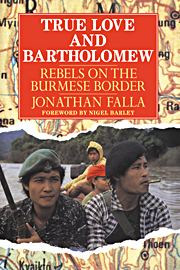Book contents
- Frontmatter
- Contents
- List of illustrations
- Foreword
- Preface
- Acknowledgments
- 1 A bronze drum
- 2 Boar Tusk's children
- 3 White collar Flowerland
- 4 True Love at home
- 5 Water child, land child
- 6 A simple man
- 7 Fighting mean, fighting clean
- 8 Great Lake and the Elephant Man
- 9 Bartholomew's boarders
- 10 The three seasons
- Interlude: from the Kok river
- 11 Last of the longhouses
- 12 A delicate bamboo tongue
- 13 True Love in love
- 14 Fermented monkey faeces
- 15 Perfect hosts
- 16 Old guard, young Turks
- 17 True Love and White Rock
- 18 Insurgents in a landscape
- 19 True Love and sudden death
- 20 Portraits
- Notes
- Bibliography
- Index
12 - A delicate bamboo tongue
Published online by Cambridge University Press: 28 October 2009
- Frontmatter
- Contents
- List of illustrations
- Foreword
- Preface
- Acknowledgments
- 1 A bronze drum
- 2 Boar Tusk's children
- 3 White collar Flowerland
- 4 True Love at home
- 5 Water child, land child
- 6 A simple man
- 7 Fighting mean, fighting clean
- 8 Great Lake and the Elephant Man
- 9 Bartholomew's boarders
- 10 The three seasons
- Interlude: from the Kok river
- 11 Last of the longhouses
- 12 A delicate bamboo tongue
- 13 True Love in love
- 14 Fermented monkey faeces
- 15 Perfect hosts
- 16 Old guard, young Turks
- 17 True Love and White Rock
- 18 Insurgents in a landscape
- 19 True Love and sudden death
- 20 Portraits
- Notes
- Bibliography
- Index
Summary
Costard: O, they have lived long on the almsbasket of words!
Love's Labour's LostI made my first attempts to learn Sgaw Karen at my mother's house in Oxfordshire. I had two books, the Introduction to the Study of Sgaw Karen by Saya Kan Gyi (Rangoon, American Baptist Mission Press, 1915), and a Grammar of the Sgaw Karen by D. C. Gilmore (Rangoon, 1898). Both these began by requiring me to study a new script, similar but not identical to Burmese. Because of its predominantly rounded forms, this is sometimes called ‘apple script’. To me it looked like an optician's fantasy of spectacles, monocles and long-handled lorgnettes. The grammar asked me to convert these little curls into meaningful noise, assuring me that, ‘If the learner will remember to breathe hard in pronouncing the aspirates and he can hardly fail in getting the correct sound.’ The Introduction cheered me up by asking me to translate grubby phrases – ‘Who soils my book?’ and ‘I drop the ink on the organ’ – as light relief from more serious matters: ‘The light is in me but darkness is in you.’ The history of Karen literacy is imbued with a high moral tone throughout.
Some Karen believe that they once had a script and a written literature of their own, but that they lost it. Lt Col MacMahon (1876, p. 188), quotes traditions that speak of an old ‘palm leaf book that is written in circles’ but there is no sign of it now. An inscribed metal plate found among the Bwe Karen is said to be a specimen of the old script and the KNU Bulletin reproduced it in 1986.
- Type
- Chapter
- Information
- True Love and BartholomewRebels on the Burmese Border, pp. 220 - 242Publisher: Cambridge University PressPrint publication year: 1991

